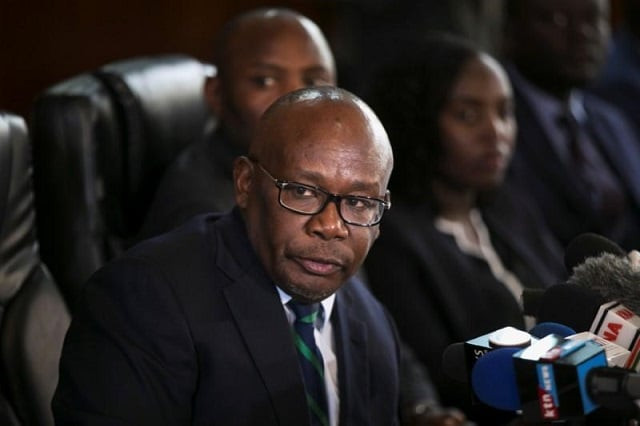Swearing in unofficial president is 'treason', Kenya attorney general says
Under Kenyan law, treason is punishable by death

Kenya's Attorney General Githu Muigai speaks during a press conference in Nairobi, Kenya September 22, 2017.
PHOTO: REUTERS
Such an inauguration would worsen the rifts opened by an acrimonious election season, when more than 70 people died in political violence. The extended campaigns eventually led to President Uhuru Kenyatta's re-election.
Clashes as Kenyatta to be sworn in for disputed second term
Attorney General Githu Muigai did not name anyone, but opposition leader Raila Odinga said last month that he would be inaugurated by a people's assembly on December 12 - Kenya's Independence Day. Unless a candidate was declared the victor in an election by the Independent Electoral and Boundaries Commission and the swearing-in was conducted by the Kenyan chief justice, Muigai told a news conference, such a inauguration is "a process wholly unanticipated by the constitution and is null and void".
"The criminal law of the Republic of Kenya stipulates that sort of process is high treason," he said. "It is high treason of the persons involved, and any other person facilitating that process." Under Kenyan law, treason is punishable by death.
Kenyan capital on edge as Supreme Court ruling looms
Muigai said people's assemblies proposed by the National Super Alliance, Odinga's opposition coalition, were illegal as well. "These institutions are unconstitutional they are illegal, they are null and void. The persons involved in their creation are involved in extra-constitutional activity and may be visited by the full force of the law," he said.
Odinga and Kenyatta faced off in an election in August that Kenyatta won. But the Supreme Court nullified the result, and a repeat election was held on October 26.
Odinga boycotted that vote, saying reforms needed to avoid "illegalities and irregularities" had not been made. Kenyatta won again, with 98 per cent of the vote.



















COMMENTS
Comments are moderated and generally will be posted if they are on-topic and not abusive.
For more information, please see our Comments FAQ